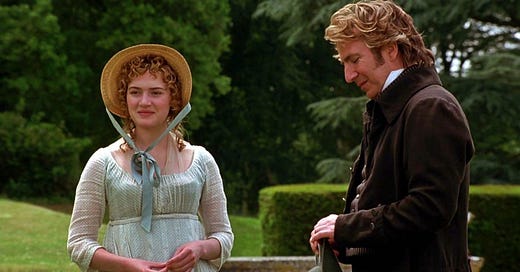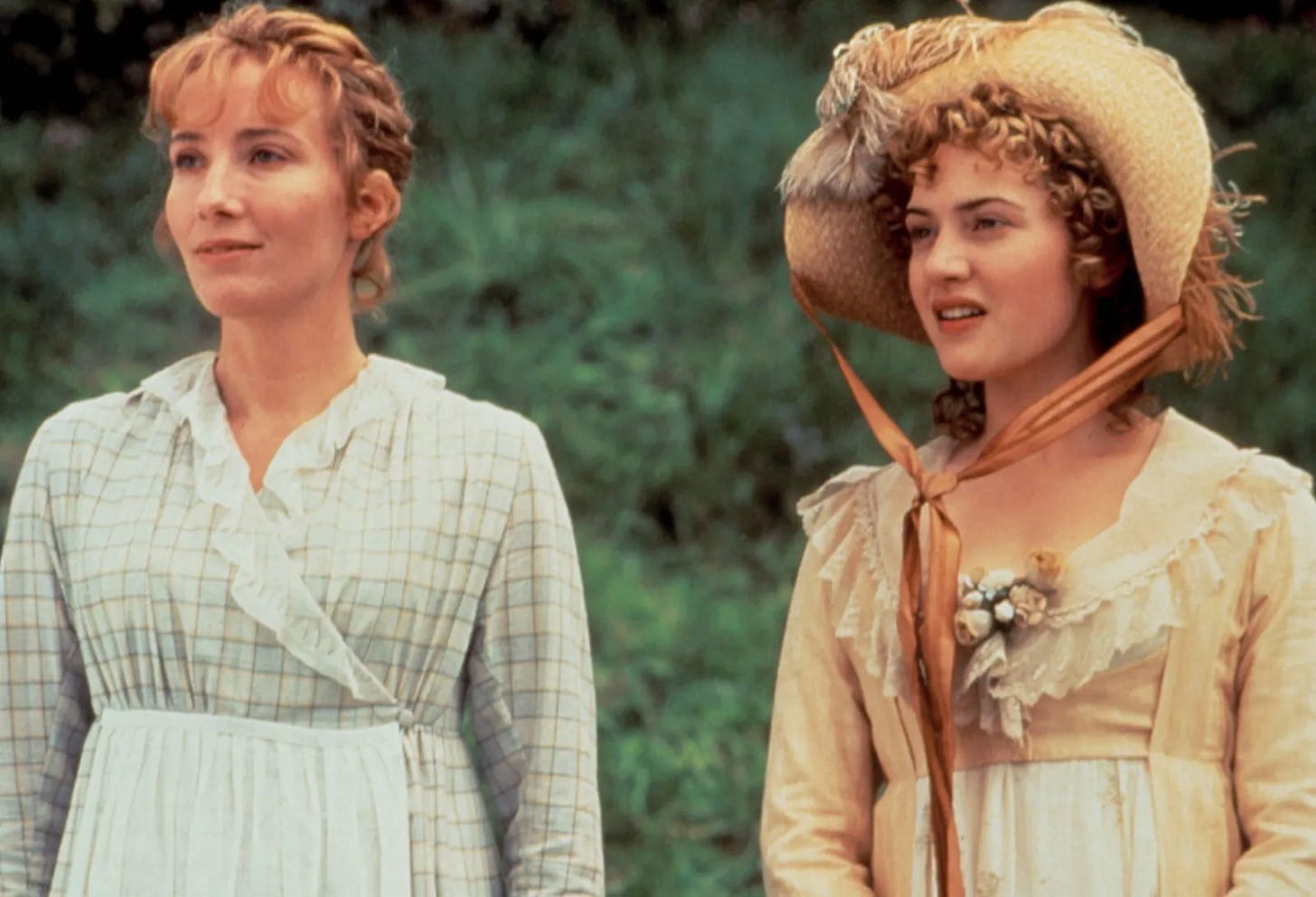SENSE AND SENSIBILITY (1995) | Jane Austen Month
A collaboration between Dominic and Mary Morlino!
Welcome to Jane Austen Month 2025! Since the very beginning of St. Luke’s Sketchbook, I’ve wanted to do some themed months, and Jane Austen adaptations immediately rose to the top of my list. I’ve chosen the four movies I think are best, and I’m looking forward to showcasing these well-loved repeat watches! (Rest assured, fans of the Pride and Prejudice miniseries; your day will come.) Best of all, each review will feature a section written by my wife about the costumes of the film, because these movies are a real labor of love from the costume departments and they deserve some extra consideration. Then I’ll conclude the month with a Jane Austen Oscars (a “Jane Au-scars”, if you will), where I will compare the four movies against one another in various categories and see who comes out the champ!
But before we start this first review, a few brief words about Jane Austen. She was born in Hampshire, England, in 1775, and died there in 1817, at just 41 years old. She was the seventh of eight siblings and had many nieces and nephews. She reportedly loved, but never married. She wrote several novels in her twenties but didn’t get published until 1811. She wrote anonymously (common for female authors of the time) and mostly sold her novels on commission rather than selling the copyright; this meant greater potential financial risk and reward. Her books did somewhat well within her lifetime, but grew vastly in popularity over time after her death. There are dozens of popular film and television adaptations of her novels.
The film Sense and Sensibility is directed by Taiwanese filmmaking legend Ang Lee, and is written by Emma Thompson, based on Austen’s first novel. It is Lee’s first film in the English language and Thompson’s first screenplay. The film stars Thompson, Kate Winslet, Alan Rickman, and Hugh Grant. It was released in December 1995 to universal acclaim, earning $135 million worldwide on a budget of $16 million. It received seven Academy Award nominations, including Best Picture (it lost to Braveheart); Emma Thompson’s script won Best Adapted Screenplay.
And what a brilliant, beautiful screenplay! Forgive me for being too effusive, but there really isn’t much of anything to criticize about the screenplay or the movie in general. Emma’s screenplay moves deftly from one scene to the next with nothing extraneous in between; the characters feel devastatingly real and human; the Regency Era-etiquette and rules are understandable and approachable; and the humor is hilarious. I love the subtle relatable moments like when Elinor wakes up after her vigil at Marianne’s bed and immediately reacts to her aching neck. I love the friendship between Elinor and Colonel Brandon. And that moment when Elinor sees Lucy use the exact same handkerchief that she got from Edward. How is this Emma Thompson’s first screenplay?! It almost makes me mad how good it is.
Emma apparently spent several years writing and rewriting drafts of the screenplay, and by the end, would collaborate with Ang Lee after he’d been hired to direct the movie. It must have been absolutely fascinating to sit in on the meetings with the two of them. I’d love to know how close the final script aligns with the final cut of the movie - where Emma ends and Ang begins. Specifically on hilarious moments like after Willoughby leaves, and Margaret, Marianne, and Mrs. Dashwood are all crying, and Elinor is just sitting on the stairs with the cup of tea meant for Marianne. Again, how is this Ang’s first English movie? I guess the best stories really do transcend human language. Indeed, Ang Lee himself said that it was his upbringing in the more restrictive culture of Taiwan that made him understand the world of Regency-era England and its etiquette. This would make him a better pick for director than an American or even a modern English filmmaker. He's also said that Jane Austen is his “destiny” and that “all along, [he] had been trying to do Jane Austen without knowing it.”
I’m not surprised that Thompson didn’t win the Oscar for Best Actress for this, considering she’d just won Best Actress a few years earlier, and because she still went home that evening with her second Oscar statue anyway (she’s the only person ever to win Oscars for writing and acting). Still, her performance is just wonderful. I think it’s funny that she didn’t originally intend to play Elinor in the movie. Her wit, self-sacrifice, and love for her family shine through in every scene, and her emotional restraint in earlier scenes only makes her few strong displays of emotion all the more powerful. I can absolutely relate to Elinor’s apparent physical pain at the act of crying.
Everyone else in the cast is predictably great. Kate Winslet’s youthful exuberance is infectious and a joy to behold. I love how even though the romances are important, so much of the movie is just all the ladies hanging out. Of the four most prominent male characters in the movie, I love how they each present such a distinct image of manly virtue (or vice): Alan Rickman’s strong, stoic Brandon; Hugh Grant’s sweet, awkward Ferrars; Greg Wise’s rakish knave Willoughby; and Hugh Laurie’s savagely sarcastic and disinterested Palmer. The one last cast member I want to shout out is the late great Tom Wilkinson, who appears in one scene as Mr. Dashwood. RIP Tom! He had such a great career that when I was scrolling through his filmography on Letterboxd, it wasn’t until the tenth row that I didn’t recognize any titles.
For anyone keeping track, there are SIX actors and actresses in this movie who would go on to appear in one or more Harry Potter movies: besides Emma Thompson and Alan Rickman, there’s Gemma Jones (Mrs. Dashwood, Poppy Pomphrey), Imelda Staunton (Charlotte Palmer, Dolores Umbridge), Robert Hardy (Sir John, Cornelius Fudge), and Elizabeth Spriggs (Mrs. Jennings, Fat Lady Portrait). And yes, I will be keeping a tally as we go through these four movies.
The last thing I want to talk about before handing the reins over to Mary is the music by Patrick Doyle. My goodness. Patrick Doyle might be everyone’s favorite composer that they don’t know by name (maybe right behind Thomas Newman). He certainly should have won an Academy Award by now, for this movie or for any number of his collaborations with Kenneth Branagh. His music throughout is light and rich and beautiful. Every time I hear Marianne’s theme (“Weep You No More Sad Fountains”), I want to weep! That theme is the exact sound of heartache. Gorgeous!
Without further ado…
Mary’s Costume Corner
As Colonel Brandon is the “kindest and best of men,” so is this movie truly the best of all Jane Austen movie adaptations. The costume designers, Jenny Beavan and John Bright (of Merchant Ivory fame) are simply brilliant here, utilizing color, texture, and subtle details to create a cohesive and thoughtful tapestry throughout the film.
One of my favorite things about this particular time period (early decades of the 1800s) is the dedication to Grecian-inspired dress. We see this in the flowing, graceful lines in the dresses, more relaxed corsetry, and simple ribbon-twined and softly curling hairstyles. This plainer style seen on younger, less-wealthy characters like Marianne and Elinor also serves as a contrast to the wealth of such ladies as Fanny Dashwood and Mrs. Jennings, with their many frills and laces, more colorful fabric choices, and more elaborate hairstyles and accessories (think Elinor’s one long, gold chain versus Fanny’s many different embellished headpieces).
We spend the most time within the Dashwood home, and I think it’s lovely to see how each of the ladies of the household show their different personalities through dress. We get to see mourning dress especially on Mrs. Dashwood, and also the contrast between Elinor’s simpler, more practical wear, since she’s often working in the garden or around the cottage, and some of Marianne’s more fanciful choices (even her nightgown has many more frills than Elinor’s). And Margaret’s character at eleven years old is a sweet example of the child’s style of the period, utilizing sensible shawls and outerwear, and loose, unstyled curls.
A small note for the men – though the male dress is never quite as interesting, I still appreciate the differences we get to see in classes. One detail I noted this time around was that the Dashwood’s manservant, Thomas, has an especially interesting shirt in the scene where he relates that he’s seen the newly-married Mrs. (Robert!) Ferrars. His shirt sleeves are of a different, thicker material, as if they’ve been replaced or were simply made more durable given the amount of wear they’d see.
And finally, I’d like to highlight my personal favorite costume – Elinor’s plain blue and white gingham dress that she wears several times. It’s more casual than the well-known deep blue dress that matches her eyes perfectly, but somehow it just suits her so well, and really allows Emma Thompson’s features to shine through. The repeat-wearing points to it being one of Elinor’s favorites as well, and I love that she both gardens in it and is wearing it when she receives Edward’s proposal. With just a touch of white frill trim, it shows Elinor’s quiet and sweet femininity, and underscores the durability and wisdom she brings to the whole beautiful story.
Big, big fan, Jenny and John! I could watch this movie forever.
Score: 10 out of 10! Seriously, what flaws does this movie have? The fact that I don’t like Willoughby’s face? That’s a positive. The fact that Mrs. Jennings is annoying? Positive. The fact that Tom Wilkinson is only in one scene? Sad but necessary.
Value for a Catholic audience: Good! It doesn’t feature explicitly Christian themes and content, but like all of Austen's work it is shot through with Christian sensibilities and a Christian framework. Is it just a coincidence that Marianne stays home from church on Sunday to meet Willoughby, right before he rejects her to return to London? Nay, it is not.
Next up: Persuasion (1995)!







Love this and can’t wait for the next one! The 1995 Persuasion is my all time favourite Austen adaptation